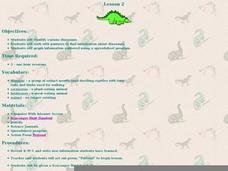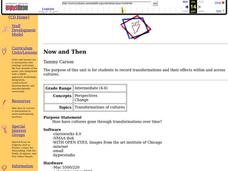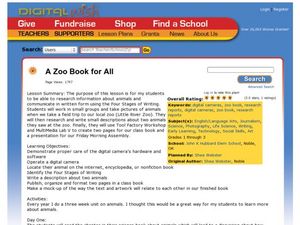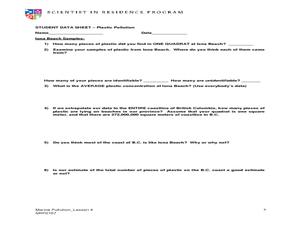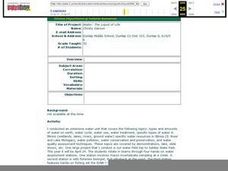Curated OER
Dinosaur Scavenger Hunt
Students conduct research on dinosaurs and graph the information gathered using a spreadsheet program. In pairs they complete an Internet scavenger hunt, and record five facts about dinosaurs in their science journal.
Curated OER
Now and Then
Students record transformations and their effects within and across cultures. Students study the life of specific people in a former time period and then in the present time period. This teacher focused on the Winnebago tribe, using her...
Curated OER
A Zoo Book for All
A visit to the local zoo launches an integrated life science/ language arts research project into the habitat, feeding habits, offspring, lifespan, and other interesting facts about animals. Each group selects two animals to photograph...
Curated OER
Nutrients In Chesapeake Bay
High schoolers perform pH and turbidity test to determine water quality. In this environmental science lesson plan, students analyze NASA database on chlorophyll-a in the bay. They explain how a small river area affects Chesapeake Bay.
Curated OER
Zoo Animal Experts
As part of an exploration of zoo animals, kindergarteners conduct research on their favorite animal and compile their information. Learners write about their animal in a journal and create a trading card. The culminating activity is a...
Curated OER
Plastic Pollution
Young scholars determine with math concepts how much plastic pollution is affecting marine life. In this plastic pollution lesson plan, students collect scientific data from a field trip to a water treatment plant.
Curated OER
Science Safari: Energy Resources
Learners pick a topic that is related to energy and power companies, tools, and careers. They organize information, photos, illustrations, video, or other graphics into a presentation.
Curated OER
Integrating Physical Science and the Geological Environment
Students undertake a series of experiments and activities related to geology, especially in Connecticut. They evaluate types of rocks, minerals, and crystals, exploring the main concepts of geology.
Curated OER
The Science Behind Dolphins
Young scholars discover facts about marine mammals, specifically dolphins. In this K-2 lesson plan, students identify the different species of Cetaceans, focusing on dolphins. Young scholars answer true/false questions regarding...
Curated OER
Becoming Africa's Wildlife
Students take a "trip" to Africa. In this Africa lesson, students watch a National Geographic video on animals from Africa. They pick an animal to research, create a poster about, and make a field guide.
Curated OER
Environment: The River Classroom
Seventh graders engage in hands-on experiments and activities dealing with rivers and greenways. They also observe lectures and demonstrations by experts in water and river restoration. Students and teachers participate in canoe trips...
PBS
Scavenger Hunt
Learners conduct field research of a historical site in order to discover a more complete understanding of a time period. They visit a site of historical significance and complete a scavenger hunt about the area.
Curated OER
ABC's of Dinosaurs
Students develop an ABC Book using KidPix Productivity software to create a multimedia slide show applying all they have learned about dinosaurs. They participate in a virtual field trip to find information.
Curated OER
What's In A Name?
Students create a binomial system of nomenclature for classifying organisms they encounter in a field trip to a natural history museum or from pictures in library books. They work in small groups to create accurate drawings and place...
Curated OER
Look What I Found Out!
Students attend a field trip. Upon their return to the classroom, students write unanswered questions related to the field trip. Using the internet and other resources, students find answers to their questions. They write their...
Curated OER
Transportation Systems: Two Liter Boat Activity
Students design and build full-size boats made out of two-liter plastic bottles, chicken wire, and plywood. Then they race the boats, with the boat's designers "manning the hull", in the school's swimming pool.
Curated OER
Sea World Fieldtrip Follow-up
Students create a graphic organizer in preparation for a web page about a specific science-related topic. This lesson is used as a follow-up to a field trip experience and can be adapted for many different subjects.
Curated OER
Water: The Liquid of Life
Sixth graders complete a lesson on the properties, types and amounts of water on Earth. In groups, they travel between stations to identify water resources in Illinois and pollution sources. They complete the lesson with a field trip...
Curated OER
Bugsicles (A Frozen Insect Larva You can Find!)
Students explore how animals survive in the winder. After attending a gall-collecting field trip, students place them in a freezer. Once frozen, the students open the gall flay larva and observe it as the larva revives. Students...
Curated OER
Identification of Wildfire/Structure Interfaces, Risk Assessment of Structures, and Risk Management
Students participate in a class discussion about wildfire and urban interfaces as well as risk of wildfire in the area in which they live. After reviewing a wildfire/urban interface fire safety checklist, a walking field trip is...
Curated OER
Exploring Great Salt Lake
Fourth graders go on a field trip to make observations about plants in the Great Salt Lake area. They make observations about the environment and record the types of pants that are living there. The lesson is to introduce the concepts of...
Curated OER
Classify Forces
Third graders compare and contrast the forces of pushing and pulling. As a class, they take a field trip around the school and write down any action they see and any object that is motionless. In groups, they use magazines to cut out...
Curated OER
Graphing Water Temperature
Students graph water temperature using probe software and a Palm on a class field trip to a lake or pond. Emphasis is placed on collaboration with high school science students and the use of ImagiProbe software.
Curated OER
Fuel Cells
Students examine how fuel cells and combustion engines work. Using the internet, they research the positives and negatives of the various energy sources. In groups, they complete an experiment with a working fuel cell model and take a...
